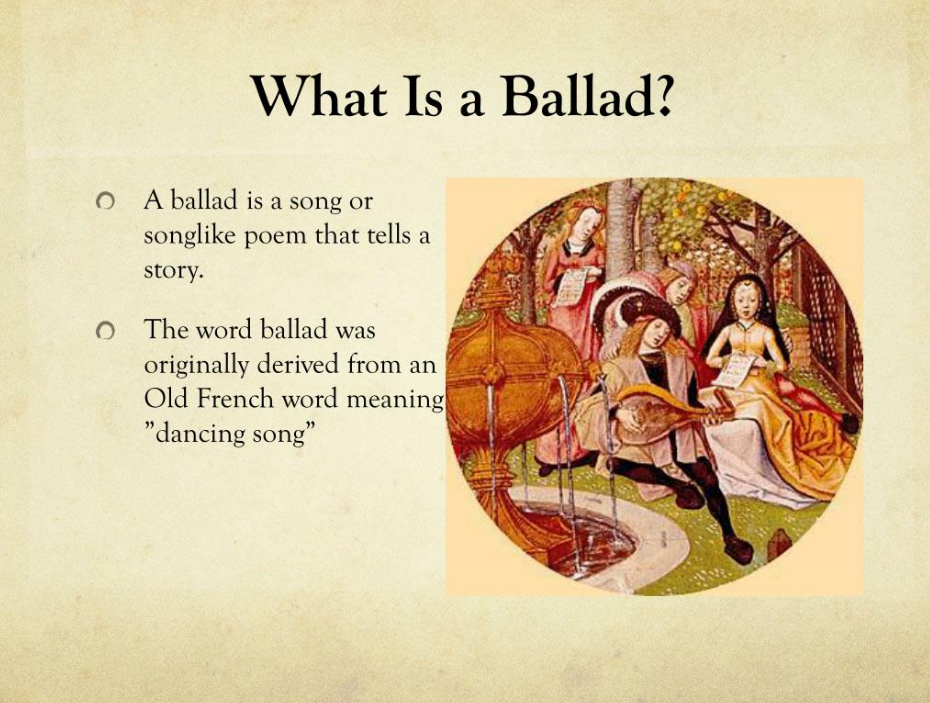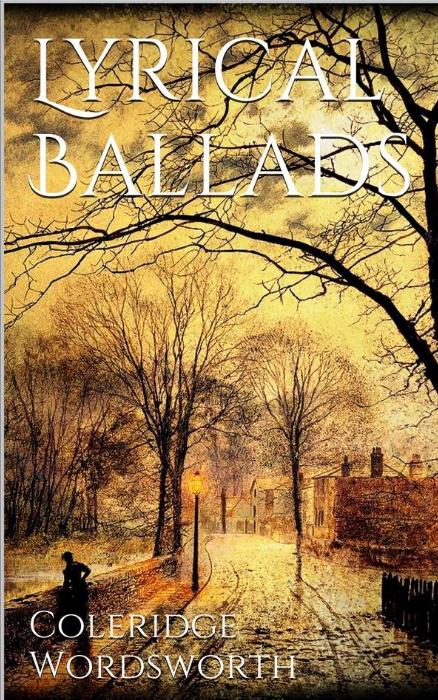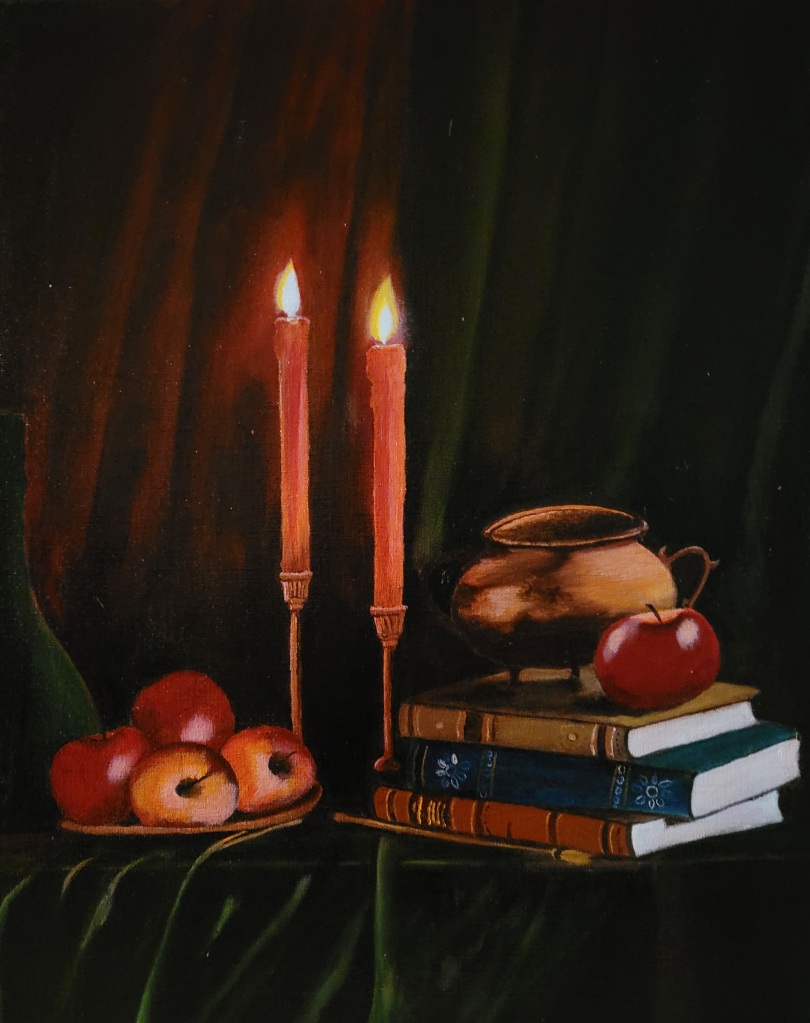
Ballad has been there for several centuries (around 13th century) and started off as folk songs, accompanied by musical instruments. Earliest ballads were transmitted orally in song form and mainly dealt with religious and folk lyrics. The ballad’s lyrical rhythm and rhyme owe to the fact that this poetic form is rooted in song telling a love story. It was popularised as a singer’s choice due to the rhyming tone. It was used mostly as dance music with traditional folk songs during the fifteenth and sixteenth century. It fell into disrepute during the late 17th century with street sale of broad sheets with romantic ballads and was considered ‘street music’ written by ‘down and outs’ living in the unsavoury part of the towns. The poets were often titled “pot poets” – a derogatory term for the ballad poets of 19th century. The theme could be anything from love to hate and often used to tell stories and even history. The ballad often did not tell the story but showed the story in words. It was mostly a plot driven poem, running at a canter to end in a dramatic conclusion in the last two lines.
The traditional ballad was performed in dance halls in time with the music, and the term ultimately derives from the Latin word ballāre meaning “to dance.” It is also the origin of the word Ballet. French popularised it in 13th century as Balladee. French also introduced Ballade – as a form of dance music during 13th century. This form of narrative poem is structured with an unspecified number of rhymed quatrains (four-line stanzas). The lines were often quite simple with three or four stresses. Usually the second and fourth lines rhymed, but there were many variations of the ballad making it difficult to define. During the medieval period, the wandering minstrels used the ballad structure for their songs. Ballads about Robin Hood were sung during the 14th century medieval England.
Samuel Taylor Coleridge and William Wordsworth wrote numerous ballads. “The Rime of the Ancient Mariner” by Samuel Taylor Coleridge and “Annabel Lee” by Edgar Allan Poe are particularly famous examples of ballads. The “Rime of the ancient Mariner” is still considered as the best classic of genre;
It is an ancient mariner
And he stoppeth one of three
By the long grey beard and glittering eye
Now wherefore stoppest thou me?
The bridegroom’s doors are opened wide,
And I am next of kin;
The guests are met, the feast is set;
Mayst hear the merry din.”
He holds him with his skinny hand,
“There was a ship,’ quoth he.
“Hold off! Unhand me, grey-beard loon!”
Eftsoons his hand dropped he.
He holds him with his glittering eye –
The wedding guest stood still,
And listens like a three-years’ child
The mariner has his will
Samuel Taylor Coleridge
The ballad made its way onto British poetry in a big way during the 19th century with the likes of Samuel Coleridge, only to peter out in time. There were many types of ballads over the centuries. Traditional Ballads were sung by minstrels during the medieval period. Some of the biggest names in poetry – Samuel Pepys, Robert Burns, Walter Scott and Robert Harley to name a few, wrote many Traditional Ballads. I have already alluded to the “cheap ballads” – Broadsides – with the onset of cheap printing during 16th century. To counter this movement as it were, Literary Ballads appeared with many well-known works from Samuel Taylor Coleridge, Robert Burns, William Wordsworth and Oscar Wilde. Operatic Ballads made their appearance during the 18th century to counter the invasion of Italian stage operas into London. Sentimental Ballads made their appearance as a development of “Broadsides” – they are slow soulful songs appealing to the young lovers everywhere.
Heart of Stone
A broken heart imbues melancholy into a lover and brings out the intense passion and a sense of despair in his or her heart;
Oh, my dearest love, a proud one not be proud.
What you have in your heart is utterly false precious
Don’t be angry with your lover, no you should
Chain me in your arms, shelter me with kisses yours.
And still if you think the fault is mine
Pierce me with arrows of your side glances
The magical and bewitching smile of thine
Gifted woman, perfect skill in archery you possess.
You pierce men’s hearts with only a bowstring, no arrows
Your eyes are of blue lily, your mouth a heavenly gem
Teeth from jasmine buds, lips from the vernal flowers
And He made your limbs from daintiest stem.
Why is it the Creator made your heart out of stone?
How is it that He did not give me a heart of stone?
My Love, my strength
The emotions that are stimulated at the start of a relationship, matures as it develops, and the subtle changes are often difficult to explain in prose. Both men and women find strength as well as weaknesses in their relationships as it blossoms in time. One man’s strength is often seen as another man’s weakness in similar situation in a relationship.
My mind veers from work, my dearest
I would find a way, which is nearest,
I am utterly weary of my home,
To my heart, that is my dearest.
My life was wet and was drowning
I never thought I would fall in love
My heart was dry, constantly draining
My life was dreary and dry without love.
For without you, my life was drab
Bright is the day I know not, with sunbeams
Slow heart and painful, as an injured crab
And the night with delicate moonbeams.
The willow is shining with golden bees
And the flowers ablaze with beautiful colours
But my heart would not see these
And my mind would be full of naiads.
It was like climbing hills and mountains
How hard was it to climb even a step?
My life was damp like a limp fountain
Water from the spout, drip, drip and drop.
But you found me sweetheart, in time
I will take wings and fly into the pond you fish.
My crab of a heart flew into overtime
You saved me and my heart in a flash.
Now, the dry sunken jar is full of wine
My heart is revived by passionate love
The most cherished and luscious wine
Is strengthening me with your powerful love.
I thank you my darling, with all my heart
My love, you are my redeemer, you don’t know
I owe you one and you are in my heart
I am singing aloud with my face aglow.
Shankar Kashyap


